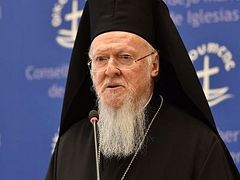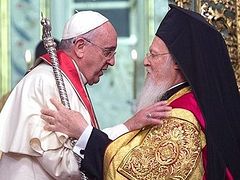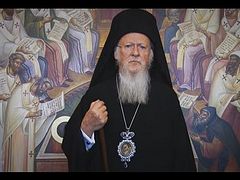Moscow, April 28, 2017
On Wednesday, April 26, His All-Holiness Ecumenical Patriarch Bartholomew left Geneva, where he had addressed the World Council of Churches the day before, for Cairo, where he attended and addressed an interreligious conference at Al-Azhar University on Thursday. His address, “Religions and Peace,” focused on the importance of religions and interreligious dialogue in today’s world, and his view of the equally peaceful nature of all religions.
The international peace conference was attended by representatives of the religious, political, and academic spheres from various states, Romfea reports. Conscious of his inter-religious audience, His Holiness speaks throughout of “religion” in general, rather than the particularities of Orthodox Christianity and union with Jesus Christ.
The patriarch opened by noting the increase in terrorist attacks over the past two decades, which have left countless dead and injured, “and which are becoming the greatest threat and source of fear for contemporary societies,” and which are typically blamed on religion. He also highlighted the simultaneous willingness for peace-promoting dialogue among political, religious, and secular leaders.
“How, then,” Patriarch Bartholomew wonders, “after so many conferences, declarations and initiatives for peace, could we witness an increase of violence, instead of noticing a progress in peace making?”
To understand our modern world, he pinpointed four areas in which, not simply Orthodoxy in particular, but religion in general plays a critical role: Religion is connected with the deep concerns of the human being, providing answers to existential questions and opening eternity to man; Religion is related to the identity of peoples and civilizations; Religion has created and preserved man’s greatest cultural achievements, moral values, compassion, and respect for all of creation; and Religion is a vital factor in the peace process.
His All-Holiness did note that religion can cause divisive intolerance and violence, but, speaking of all religions equally, added, “this is rather [religion’s] failure, not its essence, which is the protection of human dignity.”
In his explanation, the extremes of relativism and fundamentalism distort and prevent these essential roles of religion in the modern world, noting that fundamentalism provides skeptics with arguments against faith. Relativism “denies the existence of truth,” while in his presentation, fundamentalism is that which “considers that its own truth is unique, and must therefore be imposed over the others.”
The patriarch recalls the recent terrorist attacks in Paris, Brussels, Istanbul, Saint Petersburg or Stockholm, and the most recent against Coptic churches in Tanta and Alexandria. Of course, all of these attacks were carried out by Muslims and in the name of Islam, although this point does not appear in the patriarch’s speech. Describing all religions as having the same ideals, he states, “The truth is that violence is the negation of the fundamental religious beliefs and doctrine.”
Romfea notes that His All-Holiness received a round of applause from the audience gathered in heavily-Islamic Egypt when he affirmed, “We would like to oppose at least one prejudice: Islam does not equal terrorism, because terrorism is a stranger to any religion.” He also noted that the encyclical of last year’s Cretan Council also emphasizes that fundamentalism does not “belong to the essence of the phenomenon of religion.”
The Constantinopolitan prelate offered the counter-example of the Mediterranean region, which he characterized as a place of peaceful cohabitation of Jews, Christians, and Muslims over the past several centuries, where people of various religions living together find “the most fundamental message for humanity which unites.”
Drawing to a close, he called upon all nations, states, and religions to work together to overcome the violence that we see so often in our world today, as with the various Islamic attacks he had previously referenced. “We need one another; we need common mobilization, common efforts, common goals, common spirit… Our future is common, and the way toward this future is a common journey,” he stated.
In conclusion, the patriarch addressed the inter-religious gathering, with the same words of the Psalmist with which he had opened his presentation to the World Council of Churches: Behold now, what is so good or so pleasant as for brothers to dwell together in unity? (Psalm 133:1).





I would also like to know whether he has ever read the bible, outside of conducting Church services where he HAS TO read and listen to the Gospels?
How does Bartholomew explain such a statement, when the Lord Jesus Christ Himself said, "I am the way, the truth and the life. No one comes to the Father, except through Me" (John 14:6)
Bartholomew should also know that there can be no peace through these human endeavors apart from Christ Jesus, "for unto us a Child is born, unto us a Son is given; and the government will be on His shoulder. His name will be called the Angel of Great Counsel, for I shall bring peace upon the rulers, peace and health by Him. Great shall be His government, and of His peace there is no end ..." (Isaiah 9:5-6)
We must pray for Bartholomew.
The Lord have mercy on us sinners.
However, it is incorrect to say that those who express concern about Patriarch Bartholomew’s ecumenism do so ‘for reasons known only to their own pride, egos, and ignorance’ – there is widespread unease about ecumenism, and the current Patriarch’s support for it, from leading hierarchs of local Orthodox Churches to Athonite fathers to distinguished theologians to ordinary members of the faithful. To judge all these who feel and express concern as proud and egotistical is unwarranted, and such people are certainly not ignorant.
http://orthodoxinfo.com/ecumenism/ea_patriarch.aspx
And I say again raise your hands up high and rejoice.
Just one comment. In consideration that in India
alone, the religion of peace killed over 400
million people through the years, I could not
even read this article, No wonder
few truly respect this man. I bet he did
not even mention that recent attacks were
by Muslims. Oh Well.
I agree 100%! God is God, no matter what you call Him.
His All-Holiness is reported as saying that relativism denies the existence of truth. The Orthodox Church, surely, proclaims the existence of truth, ‘truth’ being Jesus Christ; the Church, unless I am wrong, proclaims that it possesses the fullness of the truth in a way which is unique to it as the One, Holy, Catholic, and Apostolic Church. In insisting on the truth of Orthodoxy, were the Church’s confessors such as St Maximus the Confessor ‘fundamentalists’ and were those martyrs whose blood adorns the Church ‘as in purple and fine linen’ ‘fundamentalists’? Are those who strive to hold to sound teaching and guard the deposit and who, being ‘not conformed to the world’, seek to guard the Church against harmonising it with modern western society likewise?